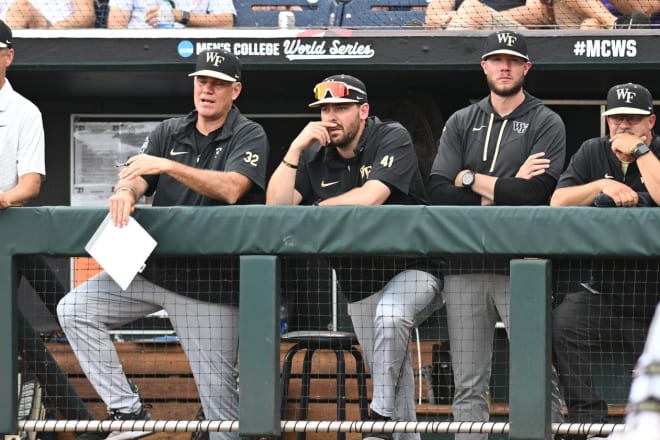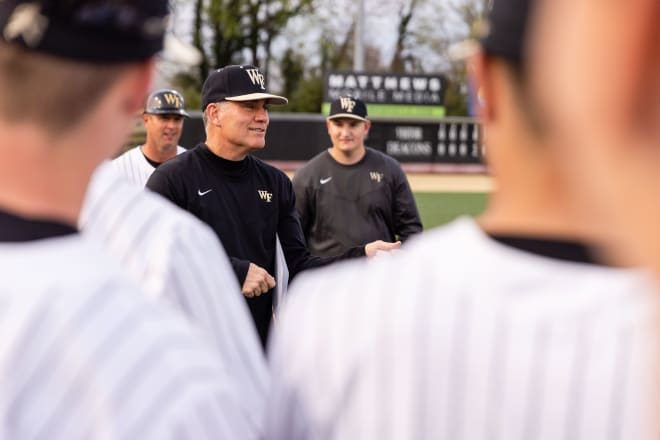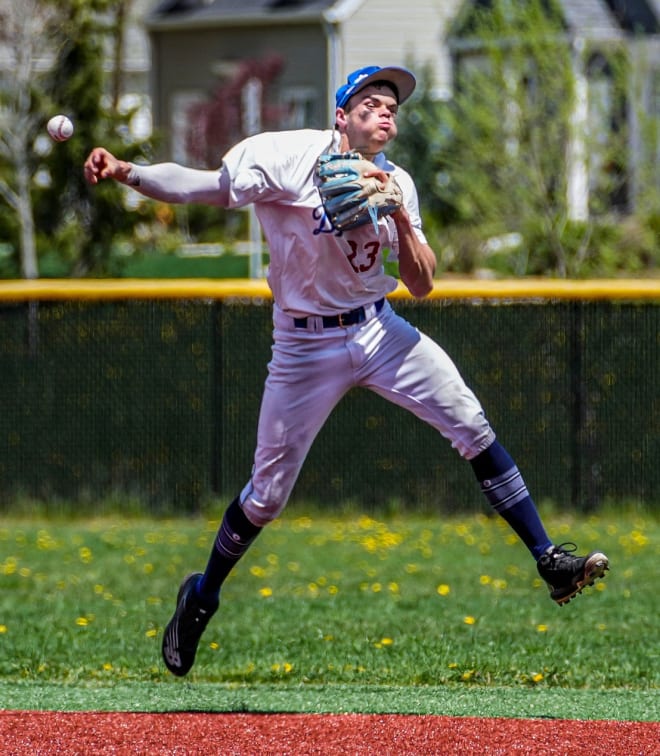WF baseball season preview: Improvements follow historic season
Where has Wake’s baseball program taken strides after a trip to Omaha? A few places, explained here

There is little doubt that a breakthrough season can vault a program to new heights.
Wake Forest’s 2023 baseball season appears to qualify as such. The 54 wins are the most in program history; the ACC regular season championship was Wake’s first since 1963; the trip to Omaha was the first since 1955.
In a year, Wake Forest went from program knocking on the door to busting through every barrier until it was three wins shy of a national championship.
When you bottle up the last two seasons, Wake Forest won 95 games, went 37-21-1 in ACC games and won 14 of 20 ACC series, with another being split. A lot of the heavy lifting there is done by last season, but it’s a two-year rise that lends toward thinking 2023 wasn’t a flash in the pan.
It’s putting success to use that will keep Wake Forest, the preseason No. 1 in a couple of polls already, atop the country.
Here are the key areas where Wake’s baseball program has improved since the end of last season:

Retention
Players, sure. It was just as important to keep players like Nick Kurtz, Josh Hartle and Marek Houston at Wake Forest as it was to bring in the crop of transfers and freshmen.
We’re talking a different form of retention here, though.
Wake’s coaching staff returned intact. Coach Tom Walter and pitching coach Corey Muscara frequented candidate lists for any power-conference job opening last summer that made even the least of sense. Keeping everyone together, with associate head coach/hitting coach Bill Cilento, volunteer assistant coach Matt Wessinger and pitching lab coordinator Mike McFerran (among others), shouldn’t be overlooked.
“One of the big things that happened over the offseason was to keep our coaching staff together,” Walter said. “We had a couple of donors step up to make that happen … we’ve got all the pieces.”
[Editor's note: McFerran left Wake Forest in the time between Deacons Illustrated's interview with Walter and publication. Sean Fisher is Wake's new pitching lab coordinator.]
One aspect here has strengthened.
Chris Lewis was a graduate student last year, having completed his undergrad degree at Wake Forest in May of 2022, and was the team’s director of analytics. That entails working closely with data, relaying it to the staff, and overseeing a team of 20-something student assistants.
He is back in that role, only as a full-time member of the staff, having completed his master’s degree in accounting last May and working for three months with the Blue Jays after Wake’s trip to Omaha.
“I think about all the stuff Chris Lewis did for us last year while he was getting his master’s in accounting,” Walter said. “Now he’s a full-time employee and the output of work from that guy is incredible.”
“We’re taking what we’ve been doing to the next level,” Walter added.
Which is the perfect segue to …
More technology
Let’s get the big one out of the way first: Wake Forest has a new videoboard.
When the Deacons were playing host to a regional and super regional series last year and the videoboard was sputtering off and on, it wasn’t the best of looks. That seemed to have resonated with important people around the program.
So, David F. Couch Ballpark will have a new one past the right field fence. It’s in the same spot — just bigger and, theoretically, more reliable.
That’s not all, though it’s the one technological improvement you’ll see as a spectator. The other steps forward are behind-the-scenes advancements.
Wake Forest installed KinaTrax to its evolving list of technical tools that spits out streams of data. According to its website, KinaTrax gathers biomechanical data during games (or practices) by using multiple synchronized cameras capturing high-speed video.
The other side of this coin is an app called 6-Tool, which is designed to test players’ knowledge of the game — think bunt assignments, rundown situations, etc.
“In years past, where we had to use our best judgement of whether, ‘Is this guy better in right field or left field?’” Walter said, “now we’ll have real data to support what we’re feeling.”
Another tool for Wake’s pitchers, in addition to the ballyhooed pitching lab, is a partnership with F5 Sports to use its pitchLogic baseball. The product of a Winston-Salem company, the pitchLogic ball has all of the makings and designs of a standard ball, except for the processing chip inside it. Within seconds of being thrown, it’s able to cycle spin rates, arm angles, release points and more through an app.
Wake’s program is one constantly looking for and evaluating technological advantages. The next logical step, without any firm plans, is a hitting lab that would go hand-in-hand with the pitching lab.

Recruiting
As far as pitches — of the sales variety, not the baseball ones for this part — go, Wake Forest has one of the strongest ones in the country.
Come to Wake Forest, where the Deacons just reached Omaha, had 10 players drafted including two first-rounders, and are set up to have as many as five first-round picks later this year.
A few days after Deacons Illustrated sat down with Walter, the program got a commitment from JD Dix, a switch-hitting shortstop from Wisconsin who’s a possible first-round pick this summer. He was an Alabama commit but reopened his recruitment because of the coaching change.
If Dix makes it through the draft and enrolls at Wake Forest, he'll be one of the highest-ranked prospects to play for the Deacons. Even if he does get drafted and signs, it's still a positive for the program that it's able to secure commitments from high-end talent.
“We’re able to get in the door with some kids that we haven’t been able to get in the door with in the past,” Walter said.
And then there’s the portal of it all.
Chase Burns (Tennessee) and Seaver King (Wingate) are the headliners, but hardly the only ones. Adam Tellier (Ball State) and David Falco Jr. (Maryland) came from NCAA tournament teams last year, and Cameron Gill’s Wofford team won 40 games.
“We’re a hot destination in the portal right now, which is exciting,” Walter said. “Now, the problem is, there’s a lot of competition for those kids and the cost of those kids is high. So, we still have to balance it with the incoming freshmen that we’re getting at a value.”
Scheduling
Wake’s early season non-conference slate and mid-week opponents look similar to how it’s looked for the past three seasons. Home, three- or four-game weekends for the first three weeks, and plenty of regional mid-majors to fill those Tuesday and Wednesday games.
It’s not always going to be that way.
“We used to travel on those early weekends and we’re going to start to do that again next year,” Walter said. “We’re going to go to New Orleans for a tournament and we’ve got a tournament in the next year at Globe Life in Texas.”
Wake Forest was in the habit of taking lengthy road trips in those early weekends. Between 2016-20, the Deacons played at Long Beach State, Santa Clara, Houston (also facing Nicholls) and USC (the one in LA).
Those types of trips were put on hold because COVID-19, so chalk this up as a late-developing return to normal.
“I like taking our guys somewhere they don’t go,” Walter said. “I don’t want to take our guys to Florida because they go there all the time, anyway. Now we’re going to go to California.”
So, with the addition of Cal and Stanford to the ACC, the Deacons will look elsewhere for those early season tournaments — like New Orleans and Arlington, Texas.
Editor’s note: This is the fifth part of a series of stories previewing Wake Forest’s 2024 baseball season. With the Deacons coming off a trip to the College World Series and reloading for another shot at Omaha, get a sneak peak at how they stack up before the Feb. 16 opener. If you’d like to read other entries in the series, links can be found here.
